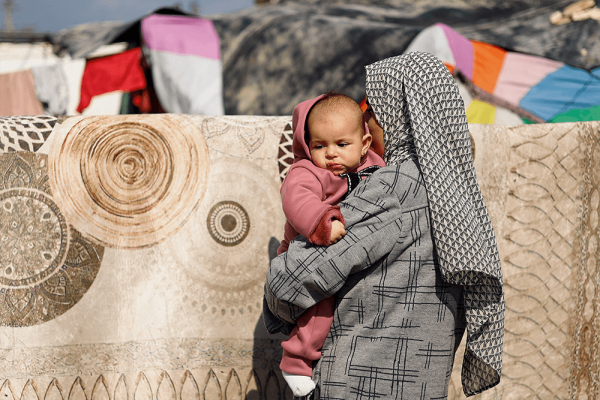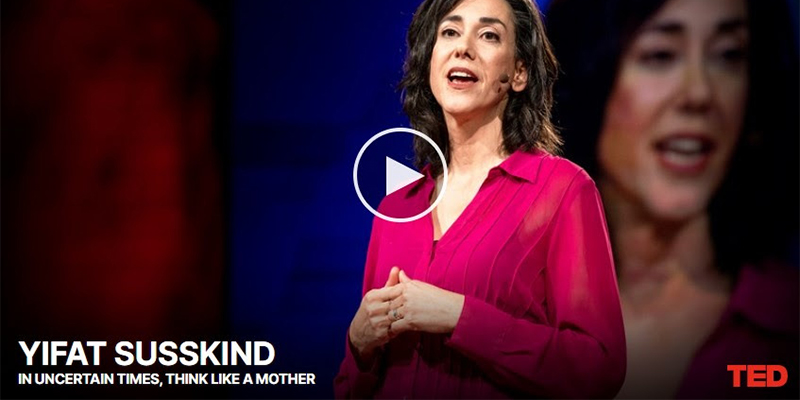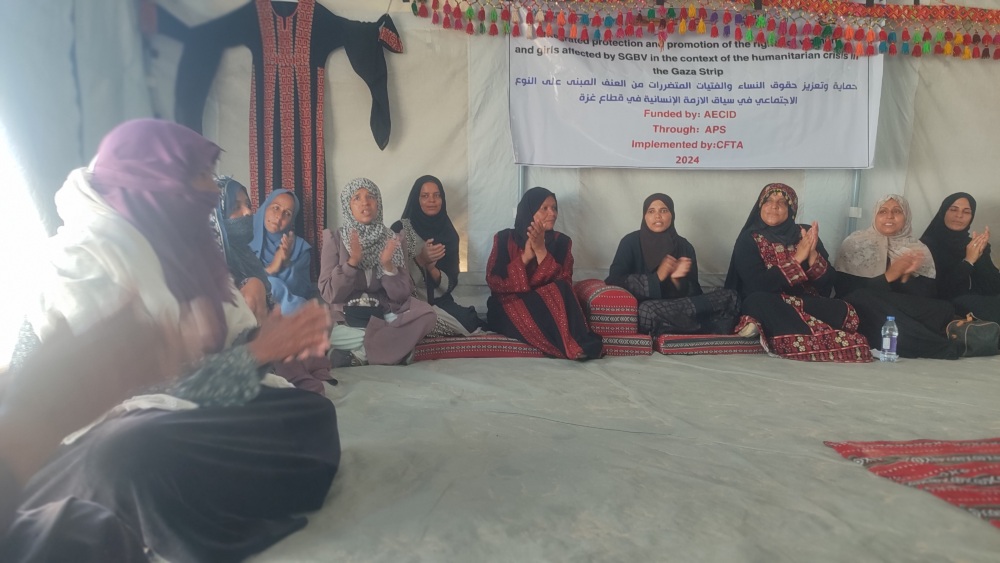
March 12, 2024
When Israeli troops stormed Nasser Hospital in southern Gaza, the ensuing chaos effectively shut down the hospital, with soldiers forcing women and children to leave the maternity ward according to Doctors Without Borders.
The invasion of the hospital underscored the heavy toll the Israeli assault has had on pregnant people and infants. Doctors Without Borders described Israel’s incursion as forcing “inhumane” birthing conditions.
Humanitarian groups say the dire conditions for birth and pregnancy strengthen the case that Israel’s actions are genocidal. Peacemakers and faith leaders told Sojourners they fear that, in addition to the physical wellbeing of children in Gaza, children’s spiritual health is at risk as violent retaliation from Israel inspires future retaliation among its victims.
Israel’s hospital raid came as images of lifeless babies and stories of unassisted births on tarps in open air have increasingly filled media accounts since Israel’s retaliation to Hamas’ attack on Oct. 7. Kate Alexander, policy officer for MADRE, a feminist, human rights organization that supports grassroots movements in more than 40 countries, said the conditions show a stark contrast with international laws and the Geneva Conventions, which are replete with standards of protection and preferential treatment for pregnant people. The conditions in Gaza are tantamount to targeting the vulnerable population, she said.
“It’s clear that today Gaza is the most dangerous place in the world to give birth,” said Alexander. In the immediate aftermath of Israeli military strikes in October, international aid organizations began warning of increased risks to pregnant people and the babies they carry. About one week after the initial onset of the war, the International Planned Parenthood Federation reported that 19,000 pregnant women were among the 1.1 million Palestinians ordered to evacuate northern Gaza. Already, doctors with local IPPF partner organizations were reporting increased miscarriages and deteriorating health conditions in pregnant women. By November, Reuters reported that cesarean section births were being performed without anesthesia, and UNICEF reported that women were unable to deliver stillborn babies, putting them at risk of sepsis.
Months later, a combination of factors — lack of medical care, malnutrition, extreme stress, and injury — have led to the 300 percent rise in miscarriages reported by Palestinian health care workers, she said, citing numbers first reported by international antipoverty organization CARE. “These measures preventing safe birth are among the key considerations when charging the crime of genocide,” Alexander said.
Specific actions to prevent procreation — or the “future generation” of the targeted people group — are mentioned in in Article 2 of the Convention on the Prevention and Punishment of the Crime of Genocide (1948). The convention defined genocide as “any of the following acts committed with intent to destroy, in whole or in part, a national, ethnical, racial or religious group,” including “imposing measures intended to prevent births within the group.”
Accusations of war crimes and human rights violations against the Israeli government continue to mount alongside graphic images of carnage and starvation out of Gaza, where more than 30,000 people, the “large majority” women and children, have been killed according to Al Jazeera. Along with prohibitive birthing conditions, the targeting of cultural leaders and journalists and blockades preventing humanitarian aid and access to medical care have convinced many in the international community that Israel’s retaliation for Hamas’s Oct. 7 attacks meets the definition of genocide.
South Africa filed a lawsuit against Israel in January, claiming that its actions in Gaza constitute not a military action against Hamas, but a genocidal campaign against the Palestinian people. Israel denies these claims, saying that Hamas has forced its hand by using civilian infrastructure for cover. The International Court of Justice did not demand a full cease-fire but did essentially put Israel on notice to take deliberate action to prevent genocide — such as ensuring the access of humanitarian aid. That has not happened, aid organizations say.
<h2>Blocking aid</h2>
Whether or not it meets the criteria for genocide prosecution, human rights organizations have responded with force to the well-documented withholding of humanitarian aid in Gaza. On Feb. 20, four human rights organizations in Israel — Gisha, HaMoked, Physicians for Human Rights – Israel, and the Association for Civil Rights in Israel — sent a letter to the Israeli government demanding that the country meet its obligations under international law with regard to civilian aid.
The letter appeals to the regulations attached to the fourth Geneva Convention governing war, and outlines Israel’s obligations to Gaza as an occupying power.
“This positive obligation means that Israel itself must provide humanitarian aid to the residents, and to the extent that it is prevented from doing so, then, at the very least, ensure its passage and safe distribution to the population that depends on it,” the letter states.
Israel consistently denies that it is refusing aid for Gaza but reports from journalists and the aid agencies on the ground tell a different story. The letter detailed some of the direct aid-restricting actions of the Israeli government, including the bombing of an aid truck and denial of access for the majority of UN aid missions north of Wadi Gaza.
“Areas with limited to no humanitarian access, and a high disease burden and food insecurity, are likely to experience a more rapid deterioration in the nutritional status of children under 5, pregnant and breastfeeding women,” said a report from the Global Nutrition Cluster, a group of international agencies, NGOs, and researchers.
The report also found that 90 percent of children from 6-23 months old and pregnant and breastfeeding women were eating two or fewer food groups per day, and most of the food available was of low nutritional value. With low nutritional diversity and 81 percent of households lacking access to clean water, disease has run rampant, especially in children. At least 90 percent of children under 5 are affected by at least one infectious disease and 70 percent had diarrhea in the two weeks before they were surveyed.
Measuring the effect of Israel’s actions on Gaza is challenging, according to many nonprofits, because nutrition in Gaza was inadequate even before Oct. 7. Withholding food in particular has been a regular mechanism of Israel’s occupation. In 2012, the world learned that the Israeli government used a calorie count on food imports shortly after Hamas took control of the region in 2007. The human rights group Gisha said Israel kept food imports into Gaza at subsistence levels, just above starvation. For years prior to 2023, the region was heavily reliant on international aid, with almost 70 percent of people in Gaza experiencing food insecurity due to decades of blockades and bombings in agricultural areas.
All of this spells disaster for pregnant people and young children. Pregnant people beginning their pregnancy from a normal weight and nutritional intake need between 400 and 600 additional calories per day — a rough estimate taken from various U.S. based guidances. As Gaza approaches famine conditions, relief agencies say most people are at times going full days without food at all. More than half a million people in Gaza — a quarter of the entire population — are now believed to be in a “catastrophic” food crisis, meaning a high risk of mass starvation and death.
November estimates by the World Health Organization put the number of pregnant women in Gaza at around 50,000, with more than 180 giving birth every day. Around 15 percent of the women giving birth in the region are expected to experience complications requiring additional medical care, according to UN Women and WHO.
Watching conditions deteriorate, Washington, D.C.-based medical anthropologist Ferhan Güloğlu and Istanbul-based gynecologist Sare Davutoğlu, began to mobilize a nimble aid network, “Safe Birth in Palestine.” The goal is to get supplies into the region and provide WhatsApp and messaging channels for pregnant people to reach out for medical advice, and they have created videos to instruct women through an unassisted birth.
“I emailed [prospective aid partners] saying: ‘Look, something is unfolding in front of our eyes. It’s not just a huge humanitarian crisis, but this crisis is especially targeting pregnant and postpartum women,’” Güloğlu told The Guardian. “This is a war on birthing people, this is a war on birth.”’
As the conflict goes on, Güloğlu told The Guardian, there’s little advice to offer pregnant people. Efforts to send in medical supplies have also been hampered by the general blockages of international aid.
“Due to the blockage of medical supplies and power, emergency cesarean sections are now performed without anesthesia [and] without the basic sanitary needs, medically unnecessary hysterectomies are performed to save blood,” a statement from Safe Birth in Palestine and partner organizations reported.
Safe Birth in Palestine continued to pivot with each new roadblock, but the isolation of Gaza had become so complete by early February, that most efforts were hindered.
<h2>Tomorrow’s children</h2>
Mae Elise Cannon, executive director of Churches for Middle East Peace, worries that Israel’s offensive all but guarantees violence will last into future generations.
“This issue has to be resolved in this moment for the sake of Palestinians, and also for future Israelis,” she told Sojourners.
The great irony of oppression is that it rarely if ever ends in peace for the oppressor, said Cannon. Efforts to stamp out an entire culture are impossible in a globalized age, and in trying, Cannon believes that Israel is handing a future of violence to its own children as well.
On a visit to Christian Palestinian peace activists in the West Bank, Cannon was struck by the hopefulness and altruism of the activists’ 10-year-old daughter. After losing two beloved family members — one in the bombing of Saint Porphyrius Greek Orthodox Church and one who encountered an army blockade while trying to reach a hospital — the child had continued trying to raise money for victims of the war and led a prayer service in her school to pray for peace. One night, however, at dinner, the little girl told Cannon, “I want the bombs to stop falling. But I want the bombs to keep dropping on Israel.”
The child’s parents swiftly intervened and guided her through an age-appropriate rhetoric of peace and nonviolence, but as she listened, Cannon said she thought about the children who did not have parents to offer that perspective. The thousands of children whose parents Israeli forces had killed or who died as a result of food insecurity.
The trauma of loss, starvation, and terror will be incalculable, Cannon said. It’s more than just the loss of life, especially for children. The terror and disruption will impact generations of Palestinian children, and already has, she said. On past visits, she was struck by the nighttime disruptions of sonic booms, created by fighter jets breaking the sound barrier as they flew over Palestinian neighborhoods in Gaza. It was meant to create the fear of bombings, she realized. Now, those fears are real.
“What does 126 days of continual bombing do to someone’s psyche?” she said.
Experts expect it will take years to rebuild the kind of medical infrastructure needed to make birth and childhood safe again, and to treat the myriad health and mental health conditions brought about by the siege.
But those efforts cannot begin until the bombardment stops. As long as the offensive continues, Alexander said, it’s unlikely any humanitarian aid will be able to reach those children. Facing that reality, she said, organizations like hers are doing what the Palestinians on the ground are asking them to do: calling for a cease-fire.
“We do what is asked of us by the people who are on the ground … as long as they demand a cease-fire, we demand a cease-fire,” she said. “Because it is a privilege to [have the choice to] look away.”
She understands that it’s tempting for Americans to feel like the calls are ineffective, given the Biden administration’s continued support for Israel and unwillingness to put meaningful sanctions behind expressions of disapproval but she pointed to a growing international movement demanding a cease-fire. Movements in the Netherlands, Belgium, Italy, Japan, and Spain have all made progress on ending arms sales to Israel.
“We are forcing a moment of cultural reckoning with militarism that will create a political reckoning,” Alexander said.
What’s difficult, she said, is knowing that whatever time it takes to build that momentum is too long for the parents in Gaza who lack access to clean water and are too malnourished to lactate. They have to choose between starvation and mixing formula with dirty water, Alexander said, and they have to make that choice today.
In uncertain times, think like a mother
View DetailsA Year of Holding Hope through Grief
View DetailsGaza is the Most Dangerous Place in the World to Give Birth
View DetailsIn uncertain times, think like a mother
NPR’s TED Radio Hour recently selected MADRE Executive Director Yifat Susskind's TED Talk to show how, in unpredictable times, we can stay calm, grounded, and on course.


